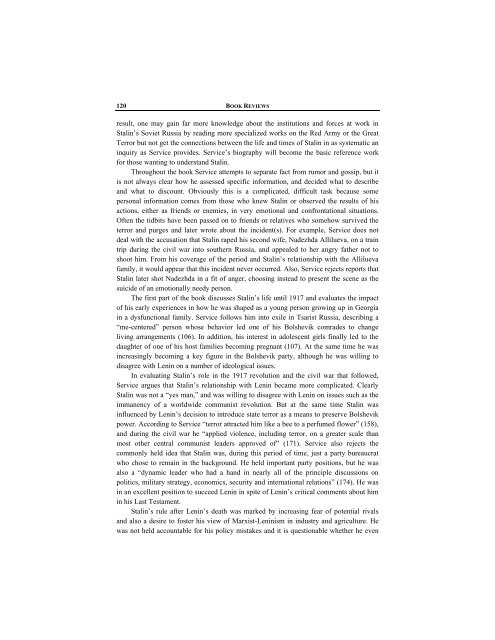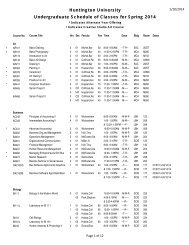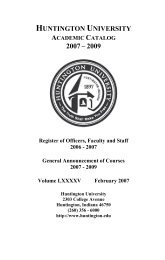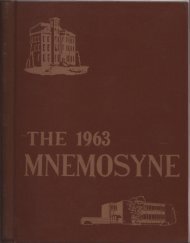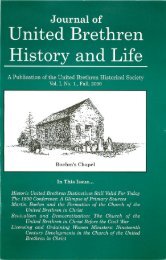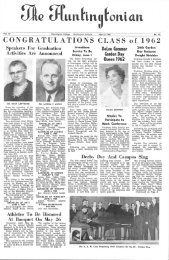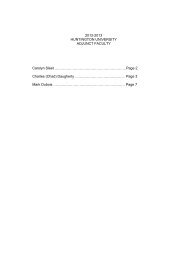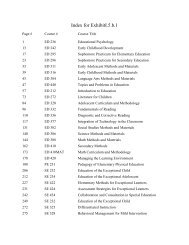Gillian Clark, Christianity and Roman Society - Huntington University
Gillian Clark, Christianity and Roman Society - Huntington University
Gillian Clark, Christianity and Roman Society - Huntington University
You also want an ePaper? Increase the reach of your titles
YUMPU automatically turns print PDFs into web optimized ePapers that Google loves.
120 BOOK REVIEWS<br />
result, one may gain far more knowledge about the institutions <strong>and</strong> forces at work in<br />
Stalin’s Soviet Russia by reading more specialized works on the Red Army or the Great<br />
Terror but not get the connections between the life <strong>and</strong> times of Stalin in as systematic an<br />
inquiry as Service provides. Service’s biography will become the basic reference work<br />
for those wanting to underst<strong>and</strong> Stalin.<br />
Throughout the book Service attempts to separate fact from rumor <strong>and</strong> gossip, but it<br />
is not always clear how he assessed specific information, <strong>and</strong> decided what to describe<br />
<strong>and</strong> what to discount. Obviously this is a complicated, difficult task because some<br />
personal information comes from those who knew Stalin or observed the results of his<br />
actions, either as friends or enemies, in very emotional <strong>and</strong> confrontational situations.<br />
Often the tidbits have been passed on to friends or relatives who somehow survived the<br />
terror <strong>and</strong> purges <strong>and</strong> later wrote about the incident(s). For example, Service does not<br />
deal with the accusation that Stalin raped his second wife, Nadezhda Allilueva, on a train<br />
trip during the civil war into southern Russia, <strong>and</strong> appealed to her angry father not to<br />
shoot him. From his coverage of the period <strong>and</strong> Stalin’s relationship with the Allilueva<br />
family, it would appear that this incident never occurred. Also, Service rejects reports that<br />
Stalin later shot Nadezhda in a fit of anger, choosing instead to present the scene as the<br />
suicide of an emotionally needy person.<br />
The first part of the book discusses Stalin’s life until 1917 <strong>and</strong> evaluates the impact<br />
of his early experiences in how he was shaped as a young person growing up in Georgia<br />
in a dysfunctional family. Service follows him into exile in Tsarist Russia, describing a<br />
“me-centered” person whose behavior led one of his Bolshevik comrades to change<br />
living arrangements (106). In addition, his interest in adolescent girls finally led to the<br />
daughter of one of his host families becoming pregnant (107). At the same time he was<br />
increasingly becoming a key figure in the Bolshevik party, although he was willing to<br />
disagree with Lenin on a number of ideological issues.<br />
In evaluating Stalin’s role in the 1917 revolution <strong>and</strong> the civil war that followed,<br />
Service argues that Stalin’s relationship with Lenin became more complicated. Clearly<br />
Stalin was not a “yes man,” <strong>and</strong> was willing to disagree with Lenin on issues such as the<br />
immanency of a worldwide communist revolution. But at the same time Stalin was<br />
influenced by Lenin’s decision to introduce state terror as a means to preserve Bolshevik<br />
power. According to Service “terror attracted him like a bee to a perfumed flower” (158),<br />
<strong>and</strong> during the civil war he “applied violence, including terror, on a greater scale than<br />
most other central communist leaders approved of” (171). Service also rejects the<br />
commonly held idea that Stalin was, during this period of time, just a party bureaucrat<br />
who chose to remain in the background. He held important party positions, but he was<br />
also a “dynamic leader who had a h<strong>and</strong> in nearly all of the principle discussions on<br />
politics, military strategy, economics, security <strong>and</strong> international relations” (174). He was<br />
in an excellent position to succeed Lenin in spite of Lenin’s critical comments about him<br />
in his Last Testament.<br />
Stalin’s rule after Lenin’s death was marked by increasing fear of potential rivals<br />
<strong>and</strong> also a desire to foster his view of Marxist-Leninism in industry <strong>and</strong> agriculture. He<br />
was not held accountable for his policy mistakes <strong>and</strong> it is questionable whether he even


